India has progressed extremely well and probably better than any country near the Indian Ocean in establishing a tsunami warning system, an internationally acclaimed tsunami expert said on Thursday.
Speaking to reporters on the sidelines of a function in Kochi, Dr Tad S Murty, University of Ottawa, Canada, said the only country that could be compared to India in establishing tsunami warning system out of the 37 countries near the Indian Ocean was Australia, which has also achieved the same level of progress.
On the major steps taken by India in providing tsunami warnings, he said in the Hyderabad-based Indian National Centre for Ocean Information System, part of the Department of Ocean Development, an 'interim warning centre' will be fully operational by September 2007.
"It does not mean that they cannot warn now, but it will be 100 per cent operational by no later than September 2007," he said.
To a question on the locality of the centre, he said "In these days of electronics, it does not matter where a warning centre is. Physical location is immaterial as the centre covers both the Arabian sea as well as the Bay of Bengal."
Scientists do not give a warning, it is given by a designated person in the government, he said.
"Scientists may have ideas but they do not have the authority to give a tsunami warning. They can only give advice", he said.
Murty said scientists can predict a tsunami after an earthquake happens.
Earthquake prediction has not progressed to a stage where we can say with certainty when the next quake will happen and where, he said and expressed optimism that we may be able to do that some day.
Replying to a query whether the coastal belts of Mumbai and Gujarat are prone to tsunami, he said Mumbai will not be affected very significantly by a tsunami, since it has some kind of natural protection.
Occurence of tsunami depends where the earthquake happens. If the quake happens in Mekeran coast, tsunami will largely hit Gujarat and if it was in Sumatra the most affected places will be Tamil Nadu, Andhra Pradesh and West Bengal, he said.
To another query whether Indian Ocean is becoming prone to tsunami, he replied in the negative.
"My feeling is there were tsunamis before also. It is really the attention that they are getting. I do not think natural hazards are increasing. It is not the number or intensity that's increasing, but what is increasing is our vulnerability to it," he said.
Mangroves upto some extend could be helpful to protect the sea waves, he said.
"If they are planted properly, we could get 50 to 60 per cent protection from the waves," he said.
Pointing out that sea walls can protect waves only in limited areas, he said, "I do not recommend putting sea wall all along the coast as they will produce lot of other problems."








